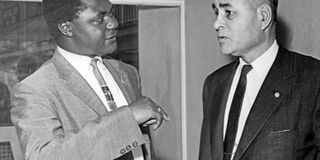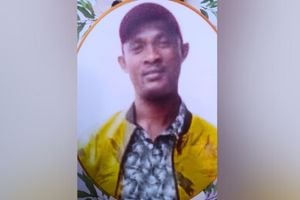Personal ambitions, ideological differences got into way of Mboya-Nkrumah friendship

Justice and Constitutional Affairs Minister Tom Mboya (left) with Dr Ralph Bunche, who represented the United Nations at Kenya’s independence celebrations in 1963. Mboya was assassinated in Nairobi in 1969. PHOTO | FILE | NATION MEDIA GROUP
What you need to know:
- Mboya’s election as chairman of AAPC enhanced his image globally and gave him a platform to highlight the plight of Kenyans under British colonial rule.
- Nkrumah, Ghana’s first prime minister and president, was overthrown in 1966 and died in exile in April 1972.
- Despite these disputes, Mboya still had great respect for Nkrumah as a leading Pan-Africanist, and always preferred not to talk about their differences in public.
In March 1958, influential Kenyan politician and trade unionist Tom Mboya was invited to the first anniversary of Ghana’s independence as the special guest of president Kwame Nkrumah.
Though he started communicating with Nkrumah in 1956 while studying at Ruskin College in England, this was the first time Mboya was meeting a man he considered his mentor, according to archive documents seen by the Sunday Nation. The influence of Nkrumah on Mboya was evident after the visit.
He was particularly impressed by Nkrumah’s line of speech “seek ye first the political kingdom”, which he recorded and made his political mantra.
DICTATORSHIP
A couple of months later, Mboya unveiled the Nairobi People’s Convention Party modelled on Nkrumah’s Convention People’s Party of Ghana.
By then, Nkrumah was already being accused of dictatorship.
In 1957, the Ghanaian president had banned regional political parties under the Avoidance of Discrimination Act. The following year, he introduced the Preventive Detention Act, which gave him powers to detain citizens without trial.
Mboya, however, dismissed this, telling his friend George Houser in America: “All the talk about dictatorship, tribal conflict, etc is nonsense. The Nkrumah government is conscious of its responsibilities and also its place as the first experiment which must not fail.”
During those years, Egypt and Ghana were aspiring to play leading roles in Africa.
That at times caused personal rivalry between Nkrumah and Egyptian leader Gamal Abdel Nasser.
“I can tell you that Nasser has no chance with Africa. Nkrumah is well established and all of us look to Ghana rather than Egypt,” Mboya wrote.
Mboya’s prestige reached its height a few months later when he returned to Ghana to attend the All African People’s Conference (AAPC).
Before heading to Accra, he flew to London to present to the colonial secretary a sworn affidavit by Rawson Macharia, who had recanted his evidence against Mzee Jomo Kenyatta.
GOOD NEWS
As he boarded his plane for Ghana at London Airport, Mboya was oblivious of the good news that awaited him.
Courtesy of Nkrumah, he had been chosen as the chairman of AAPC. Mboya only learnt about it when he landed at Asante Kotoko International Airport in Accra. In a November 13, 1959 letter to Houser, he described this as his biggest moment.
The AAPC was a non-governmental assembly attended by more than 300 political and trade union delegates from around the world, among them a representative of US President Dwight Eisenhower.
The aim of the conference was to discuss ways and means of aiding liberation movements in countries still under colonial rule.
Mboya’s election as chairman of AAPC enhanced his image globally and gave him a platform to highlight the plight of Kenyans under British colonial rule.
After the first conference in Accra, the AAPC steering committee met three times before the next conference was convened in Tunis in 1960.
By this time, some friction – partly personal – had emerged between Mboya and Nkrumah.
Opinion in Ghana was that Mboya was getting ahead of himself and had no respect for Nkrumah and Ghanaian leaders.
Within the AAPC, Mboya – with some justification – considered Nkrumah’s stooge Sylvester Paintsil to be ineffective as interim secretary general.
Misunderstanding also arose over the time and place of the next meeting of the AAPC steering committee.
US TRIP
Mboya wished to have the meeting held after his US trip as planned, while Nkrumah wanted it as soon as possible because of the prevailing political situation in the Congo, Cameroon and Mozambique.
The position was made worse by the fact that Guinea, which had been entrusted with providing a nominee for the position of secretary-general, again nominated Abdoulaye Diallo, who had initially been rejected and was opposed to Mboya’s views.
Because of these misunderstandings, the AAPC steering committee virtually fell into two factions: the Ghana-Guinea faction and the pro-West Mboya one.
The Ghana-Guinea faction held an emergency meeting in Conakry, Guinea, in April 1959 while Mboya was in the US.
Meanwhile, after a series of manoeuvres, the faction finally installed Abdoulaye Diallo the secretary-general of the steering committee, thus weakening the Mboya faction.
Mboya was infuriated upon his return. His immediate reaction was to contact his friend Taieb Salim, the Tunisian ambassador to London and the Tunisian delegates in the AAPC steering committee to help him organise a meeting in Tunis.
The meeting took place on May 26, 1959, despite attempts by Nkrumah’s ally John Tettegah to have him postpone it on the grounds that the two might split.
Weeks later, Nkrumah took Mboya to task for being arrogant and stubborn.
According to archived documents , Tanzania’s Julius Nyerere prevented Mboya from sending Nkrumah a “hot reply”.
PREACHED UNITY
Because of the publicity given to the rift by the Ghanaian press, many wanted to know the reasons Africans were attacking one another when they had always preached unity in their fight against colonialism.
Houser of American Committee On Africa (ACOA) appealed to Mboya to do everything he could to end his differences with Nkrumah.
He considered such a settlement a prerequisite to the success of the approaching second plenary conference of the AAPC in Tunis in January 1960 .
Houser believed Mboya was as much to blame for the schism as Nkrumah.
However, by December 1959, his attitude had changed in favour of Mboya.
This was after he realised that Ghanaian leaders were prepared to go to any lengths to smear Mboya as an American stooge and by the same token criticise the ACOA.
Mboya was also becoming unpopular in Ghana because of his refusal to give up links with Western-based International Confederation of Free Trade Unions (ICFTU) and the American Federation of Labour and Congress of Industrial Organisations (AFL/CIO ).
Ghana was for the idea that African trade unions should be affiliated to a Pan-African trade union organisation.
Although believing that a Pan African trade union movement could appeal to most African trade unions, Mboya was not ready to cut links with western organisations. Apart from their assistance, he felt their policies favoured workers.
In November 1959, when the AAPC steering committee convened a meeting for the formation of the All African Trade Union Federation (AATUF), Mboya was one of the delegates invited.
But due to his resentment towards the formation of such an organisation and his deteriorating relationship with Nkrumah, it wasn’t known if he would attend.
RETURN TICKET
Because of this unpredictability, Nkrumah through his personal secretary sent an invitation to Jaramogi Oginga Odinga to take part in case Mboya failed to attend.
Enclosed with the letter was a return air ticket.
Apart from the necessity of having a representative from Kenya at the conference, Nkrumah’s other intention was to see if Jaramogi could be coaxed into advocating for the AATUF in Kenya, now that Mboya had become recalcitrant.
But according to Mboya, he only came to know about the Accra meeting after he heard that a cable signed by Tettegah on behalf of Nkrumah had been sent to Jaramogi inviting him to attend.
“A few days later, I too received an invitation,” Mboya said.
He politely rejected the offer, stating that he was committed to the ICFTU meeting in Lagos, which was to take place at the same time as that of the AATUF in Accra.
After rejecting the invitation, Mboya received a cable from Ghana telling him he would be considered a traitor if he did not attend.
Mboya went to Lagos, drawing criticism from Ghanaian leaders and the press, labelling him an imperialist stooge.
On his way back to Kenya, Mboya passed through Congo where he spent a few hours at the residence of Prof Robert West of Massachusetts Institute of Technology, who was in the country to conduct a statistical survey.
RESPECT
West had spent some time in Kenya researching on cooperatives. It was during this period that he befriended Mboya.
According to a report he filed with the intelligence, Mboya arrived in Congo angry with Nkrumah, describing him “an ambitious megalomaniac”.
Jaramogi’s remark on these differences was: “Possibly, Nkrumah now regrets the special prominence he allowed Mboya to obtain from this conference, now Mboya has clearly shown he has ambitions of his own.”
Despite these disputes, Mboya still had great respect for Nkrumah as a leading Pan-Africanist, and always preferred not to talk about their differences in public.
Nkrumah, Ghana’s first prime minister and president, was overthrown in 1966 and died in exile in April 1972.
Mboya became an influential Cabinet minister and Kanu official until his assassination in Nairobi in July 1969.
The writer is a researcher and journalist based in London





